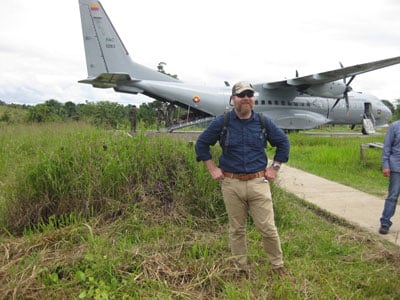Leaders in Higher Education
THIS GUIDE IS NO LONGER ACTIVE. For the current FP Guide, click here.
Daniel Rothenberg and Peter L. Bergen, Co-Directors
Arizona State University, Center on the Future of War
What is war? How are U.S. engagements evolving in the post-9/11 era? How will future wars be fought?
Exploring fundamental questions involving conflict and global security are at the heart of an innovative new interdisciplinary master’s degree program offered by Arizona State University (ASU): the online MA in Global Security.
The program is led by three professors of practice at the ASU School of Politics and Global Studies: Daniel Rothenberg and Peter L. Bergen, co-directors of ASU’s Center on the Future of War; and Jeffrey Kubiak, who co-directs the MA program along with Rothenberg.
“The MA program connects students with key university faculty and a team of national security experts, including high-ranking government officials, military officers, human rights activists, and some of the nation’s top policy thought leaders,” says Bergen, who is also a vice president of New America, a Washington, D.C.–based think tank.

“The MA program connects students with key university faculty and a team of national security experts, including high-ranking government officials, military officers, human rights activists, and some of the nation’s top policy thought leaders.” –Peter L. Bergen, Co-Director, Center on the Future of War, Arizona State University, and Vice President, New America
The MA in Global Security program builds on a unique partnership between ASU and New America via the Center on the Future of War, a research organization that focuses on the changing nature of war and conflict.
By integrating the Center’s projects into its course content, the MA program draws on the expertise of more than 100 top ASU faculty experts and the work of New America’s diverse group of prominent national security experts, such as:
- Rosa Brooks, professor and associate dean at Georgetown University Law Center and author of the award-winning book How Everything Became War and the Military Became Everything;
- David Kilcullen, who served as senior counterinsurgency advisor to General David Petraeus in Iraq and is one of the world’s foremost authorities on counterinsurgency; and
- Peter W. Singer, who has appeared on Foreign Policy’s list of Top 100 Global Thinkers and is the author of leading books on autonomous weapons, private security contractors, and the future of conflict.
The Center on the Future of War uses war as the lens for examining global affairs. “We look at the concept of war from a variety of intellectual and policy perspectives,” explains Rothenberg.
For example, one Future of War project focuses on “weaponized narrative,” which a terrorist group or state adversary may use to undermine an opponent’s civilization, identity, and will. By generating confusion, complexity, and political and social schisms, weaponized narrative confounds response on the part of the defender. A firehose of narrative attacks gives the targeted population little time to process and evaluate the information or even realize what’s hitting them.

“The MA in Global Security is for anyone who is curious about the big questions. It is designed to give students a foundation in critical thinking and in the big ideas about conflict and global security that will allow them to engage in major ideas in global security.” –Daniel Rothenberg, Co-Director, Center on the Future of War, and Co-Director, Online MA in Global Security
“We integrate material from our Future of War projects as part of the MA program’s course content,” explains Rothenberg. “We have created a community that enables conversations and decisions across disciplines and between academic and policy circles.”

David Kilcullen, ASU Future of War fellow, working on counterinsurgency issues at the Tarapaca airstrip, Colombia
In studying literature, students gain insights about war that are not widely known by policymakers. And a class on law of war may pose questions such as “What do the laws that govern conflict mean?” and “What is the underlying substance of rules of engagement?”
“The MA in Global Security is for anyone who is curious about the big questions,” says Rothenberg. “It is designed to give students a foundation in critical thinking and in the big ideas about conflict and global security that will allow them to engage in major ideas in global security.”
Students range from early and mid-career military officers to recent college graduates to international affairs professionals. Classes are taught online in seven-and-a-half-week courses that allow students to participate from any part of the world, even while on deployment in the military. A student may complete the program in as little as 12 months or take up to six years.
Graduate Degree Program Option:
• Online MA in Global Security
Visit the Request Info page to receive information from the schools.
Contents
- Leaders in Higher Education
- Johns Hopkins School of Advanced International Studies (SAIS)
- Georgetown University, Walsh School of Foreign Service
- Stanford University, Freeman Spogli Institute for International Studies
- Texas A&M University, Bush School of Government and Public Service
- New York University School of Professional Studies, Center for Global Affairs
- UC San Diego, School of Global Policy and Strategy
- University of Denver, Josef Korbel School of International Studies
- University of Washington, Henry M. Jackson School of International Studies
- Arizona State University, Center on the Future of War
- Georgetown University School of Continuing Studies
- Syracuse University, Maxwell School of Citizenship and Public Affairs; and Center for Strategic and International Studies
- University of Kent, Brussels School of International Studies
- Sciences Po, Paris School of International Affairs
- Columbia University, School of International and Public Affairs (SIPA)
- The Fletcher School of Law and Diplomacy at Tufts University
- University of Notre Dame, Keough School of Global Affairs
- Arizona State University, Thunderbird School of Global Management